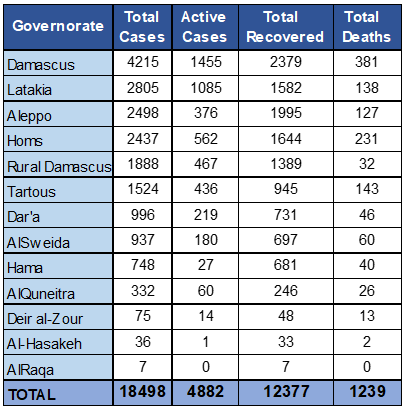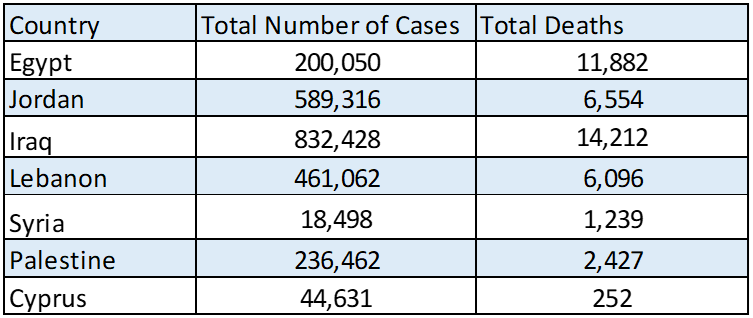MECC Coronavirus (COVID 19) Weekly Report
SYRIA: COVID-19
Humanitarian Update No. 53
Reporting period: from 22 to 28 March 2021
Coronavirus cases: 18498 Active cases: 4882 Recovered: 12377 Deaths: 1239 [1]
Highlights
In GoS-controlled areas of the country,(as of 28 Mar), the Syrian Ministry of Health (MoH) reported 18498 Laboratory-confirmed cases, 1239 fatalities, and 12377 Recoveries.
18498 laboratory-confirmed cases have been reported by the Syrian MoH : 4215 in Damascus; 2805 in Lattakia; 2498 in Aleppo; 2437 in Homs; 1888 in Rural Damascus; 1524 in Tartous; 996 in Dar’a; 937 in Sweida; 748 in Hama; 332 in Quneitra;75 in Deir-Ez-Zor; 36 in Al-Hasakeh and 7 in Ar-Raqqa.
According to the remarks of the WHO Regional Director for the Eastern Mediterranean for the Brussels Syria side event:
o As of 24 Mar, a total of 47,966 cases of COVID-19 have been reported all over Syria (government-controlled areas, NES, NWS) with approximately 2168 fatalities over the past two weeks. A sharp increase in the number of cases, especially in government-controlled areas and the northeast of the country have been observed. Specimens have recently been sent to a regional lab to help us determine whether one of the new variants that is driving increases in cases in other countries is circulating in Syria.
o Public adherence to protective measures such as wearing masks and physical distancing is low. Frontline workers are also at high risk of contracting the virus due to insufficient stockpiles of personal protective equipment. The upcoming holy month of Ramadan will pose additional challenges as people traditionally gather for prayers and to break their fast.
o WHO with partners will leverage the existing immunization programmes through the COVAX facility to vaccinate 20% of Syria’s population, including frontline workers and high-risk Syrians, by the end of 2021. Vulnerable and underserved groups across the whole of Syria will be included in vaccination campaigns managed from both Damascus and Gaziantep.
o To date, a small number of health workers have already been vaccinated in Syria; despite global vaccine shortages, WHO and partners are working hard with COVAX to ensure that Syrians all over the country have access to these tools, including people living in hard-to-reach areas. In parallel, WHO are continuing to expand COVID-19 surveillance, testing and isolation capacity throughout Syria, as well as training medical personnel on COVID-19 clinical management, and public health teams on rapid response. [2]
The Director of Ambulance and Emergency at the Ministry of Health confirmed that:
o The active cases continued to escalate, especially in Damascus and its countryside, indicating that there was no evidence that the curve had returned to stability or to decline.
o Oxygen is available to all patients in all governmental and private hospitals, as the hospitals' needs are provided through the maternity stations in each hospital, as well as through cylinders that are secured through the public authorities in the various stations.
o The referral of patients who need intensive care have started from Damascus and Rural Damascus to Homs Governorate hospitals, because the percentage of intensive care beds occupation has reached 100 % by patients in Damascus and its countryside. In addition, when the intensive care beds in Homs are full, the referral will be made to Hama. Thus, the distribution of patients to the nearest governorates will take place according to the availability of the intensive care beds. [3]
[1] Microsoft power MOH,6 March 2021
[2] WHO, Regional office for the eastern Mediterranean, 24 Mar
Lebanon: COVID-19
Humanitarian Update No. 50
Reporting period: from 23 to 29 2021
Coronavirus cases: 439,568 Deaths: 5,757 Recovered: 343,099
Highlights
Corona-related statistics from the WHO
Lebanon Received 33600 Doses of The AstraZeneca Vaccine as First Batch
During this reporting period, the average number of cases dropped to 3,458.
The Higher Defense Council declared that the general mobilization will be extended for 6 months until September.
The council instructed security forces to be strict in enforcing the adherence to wearing masks.
A total lockdown will be implemented between April 3 and April 6 for Easter to prevent gatherings and avoid super spreader events. The same strategy will be implemented for Eid Al Fitr.
The Presidency of the Council of Ministers issued Circular No. 5/2021 on 3/26/2021, whereby, based on the proposal of the Ministerial Committee, all public departments and institutions are required to work with an attendance rate not exceeding 50%.
Caretaker PM Dr. Hassan Diab warned that while Covid-19 numbers are rising, a large percentage of citizens are not adhering to measures.
The Minister of Public Health, Dr. Hamad Hassan, received in his office the Russian ambassador, Alexander Rudakov, to discuss ways to buy one million doses of SPUTNIK V vaccine directly from Russian factories, and the possibility of obtaining an emergency donation of this vaccine to speed up the immunization of some sectors.
On the 25th of March a decree was signed to enable the purchasing of a million and a half vaccines for the sake of the MOPH.
Lebanon received the first batch of AstraZeneca vaccine, consisting of 33600 vials.
The National Operations Room for Disaster Management focused during is meeting on the importance of including religious figures in persuading citizens to avoid gathering during religious events and holdiays.
Communication and Public Relations Department




